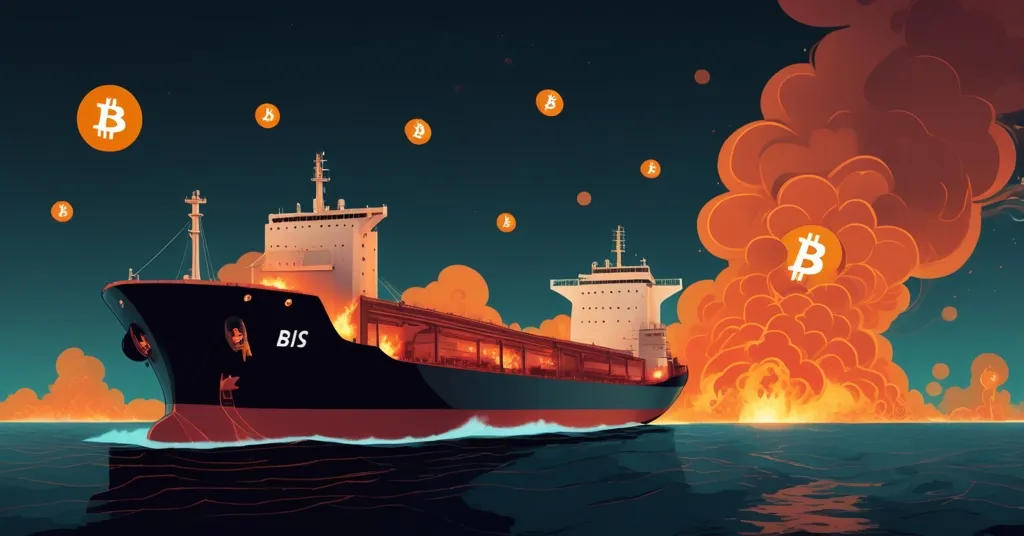Trump’s Iran Sanctions Spark Oil Volatility as Bitcoin Offers Financial Escape

Trump’s Sanctions on Iran Ignite Oil Market Tensions: A Bitcoin Lifeline Emerges
President Trump’s latest sanctions on Iran have sent shockwaves through global markets, targeting the regime’s military capabilities while stoking fears of oil supply disruptions in an already volatile Middle East. As Israel and Iran trade blows, oil prices waver, and the specter of economic isolation looms, Bitcoin’s quiet rise in sanctioned economies offers a radical counterpoint to traditional financial warfare.
- Sanctions Strike Iran’s Military: Over 20 entities, individuals, and vessels targeted for fueling missile and drone programs.
- Oil on a Knife’s Edge: Brent crude dips to $77.01, yet analysts warn of $100 per barrel if chaos erupts.
- Bitcoin’s Underground Role: Crypto becomes a financial escape hatch in Iran, despite steep hurdles.
Cracking Down: Sanctions Target Iran’s War Machine
The U.S. Treasury has unleashed a new wave of sanctions on Iran, hitting over 20 entities, five individuals, and three vessels accused of supplying dual-use technology—components that can serve civilian purposes like electronics or military uses like missile guidance systems—to Tehran’s defense sector. Hong Kong-based firms such as Unico Shipping Co Ltd and Athena Shipping Co Ltd are in the crosshairs for allegedly funneling machinery critical to Iran’s ballistic missile and drone programs. Simultaneously, counterterrorism measures target a Houthi-linked network in Yemen, with 4 individuals, 12 companies, and 2 vessels sanctioned for trading oil and illicit goods to fund Iran’s proxy warfare. Treasury Secretary Scott Bessent laid out the mission with no ambiguity:
“The United States remains resolved to disrupt any effort by Iran to procure the sensitive, dual-use technology, components, and machinery that underpin the regime’s ballistic missile, unmanned aerial vehicle, and asymmetric weapons programs. Treasury will continue to degrade Iran’s ability to produce and proliferate these deadly weapons, which threaten regional stability and global security.”
These sanctions aren’t a standalone jab; they’re part of a broader geopolitical firestorm. Iran has faced U.S. economic pressure since the 1979 Islamic Revolution, with restrictions tightening over nuclear ambitions and regional meddling, effectively cutting its economy off from global banking systems like SWIFT. The latest sanctions imposed by Trump only add fuel to an already burning conflict. The current escalation—with Israel bombing Iranian nuclear sites and Iran retaliating via missiles and drones over the past week—only ramps up the stakes. Trump’s administration is taking a calculated pause, reportedly waiting up to two weeks to decide on direct U.S. military involvement in the Israel-Iran conflict. If boots hit the ground, the fallout could be seismic.
Oil Markets Brace for Impact: The Strait of Hormuz Flashpoint
Global energy markets are caught in a high-stakes gamble as tensions flare. Brent crude dropped 2.33% to $77.01 per barrel, while West Texas Intermediate (WTI) for July settled at $74.93, with the August contract at $73.84. Despite the daily slide, weekly gains of 3.6% for Brent and 2.7% for U.S. front-month futures signal trader anxiety, driven by recent U.S. sanctions on Iran and their impact on oil prices. The real pressure point? The Strait of Hormuz, a narrow 33-kilometer waterway between Iran and Oman, through which 20-25% of the world’s oil flows. It’s the lifeline for exports from Saudi Arabia, Iraq, Kuwait, UAE, Qatar, and Iran to markets in Asia, with India alone sourcing over 40% of its 90% imported crude via this route.
Iran has a track record of threatening to block the Strait during crises, and recent signal jamming in the Persian Gulf is already disrupting shipping operations. Oil giants like Shell and shipping firms such as Nippon Yusen KK are drafting contingency plans, with Shell CEO Wael Sawan calling the Strait a critical artery for global trade, amid fears of major disruptions if tensions escalate. UBS analyst Giovanni Staunovo pegged the market’s next move to a single factor:
“The direction of oil prices from here will depend on whether there are supply disruptions.”
Ashley Kelty of Panmure Liberum didn’t shy away from worst-case scenarios, warning that oil could spike to $100 per barrel if Israel targets Iran’s export infrastructure—Tehran produces roughly 3.2 million barrels per day per OPEC data, though sanctions have slashed exports by 60% since 2018—or if Iran shuts the Strait. Analysts like Helima Croft from RBC Capital Markets note that if Iran perceives an existential threat, especially with potential U.S. military action, energy supply risks could explode, a concern echoed in discussions about geopolitical tensions affecting the Strait of Hormuz. For energy-dependent nations like India, China, and Japan, even limited interruptions could spike shipping costs through soaring insurance premiums and throttle refinery output, as PhillipCapital’s Nitin Tiwari points out. Consumers worldwide would feel the pinch at the pump.
Closer to home, U.S. domestic supply adds another wrinkle. Baker Hughes reports the U.S. rig count—the number of active drilling rigs indicating future oil production—has fallen to 554, the lowest since November 2021, marking eight consecutive weeks of decline. Fewer rigs mean less oil down the line, amplifying global supply concerns when Middle Eastern stability hangs by a thread. Meanwhile, the European Union’s retreat from a proposed $45 price cap on Russian oil reveals cracks in coordinated global energy strategies, diverging from U.S. hardline approaches and complicating responses to this crisis.
Bitcoin as a Financial Jailbreak: Crypto in Sanctioned Iran
While oil markets grab the spotlight, a quieter rebellion unfolds in Iran, where decades of sanctions have gutted the rial’s value and locked citizens out of traditional finance. Enter Bitcoin—a digital currency no government controls, letting users send or store value globally without begging a bank for permission. For Iranians, it’s not just a speculative play; it’s survival, as seen in personal stories of crypto usage under economic isolation. With subsidized electricity costing as little as $0.01 per kWh compared to $0.10 or more in the U.S., Bitcoin mining offers profits up to 25 times the cost when earnings are pegged to the dollar on black markets. Reports estimate Iran accounts for 4-7% of global Bitcoin mining hash rate, a staggering figure for a sanctioned state. For a Tehran gamer, Bitcoin means snagging a $50 Steam gift card without a bank—something impossible through conventional channels.
This is decentralization with teeth, a middle finger to financial isolation. Ordinary citizens use crypto to access international goods, from gaming credits to essentials, bypassing the iron curtain of sanctions, a tactic explored in discussions on bypassing restrictions with Bitcoin. But let’s not get carried away with the hype. Iran’s government isn’t exactly rolling out the red carpet—mining gets shut down during winter blackouts, blamed for grid strain. Infrastructure is spotty, and adoption isn’t universal. Then there’s the darker edge: if sanctioned entities scale up Bitcoin for illicit dealings like weapons trades, expect global regulators, including the U.S. Treasury’s OFAC, to clamp down harder with blockchain analytics and blacklisted wallets. Crypto’s not invisible, and its reputation could take a hit if tied to Tehran’s war machine, a concern raised in community talks on Bitcoin mining in Iran. Freedom’s got a surveillance price tag.
Other blockchains also peek into this space. Ethereum’s decentralized exchanges could, in theory, enable peer-to-peer trade without centralized choke points, though high gas fees and tech barriers keep it niche. Bitcoin’s raw, battle-tested simplicity remains king for value transfer, especially as a hedge against inflation if oil spikes to $100 a barrel and Iran’s economy sinks deeper. For us maximalists, this is why Bitcoin matters—it’s unkillable money for unkillable problems. But altcoins might carve out roles in smart contract-based workarounds down the road. Either way, if Trump escalates military action, don’t be shocked if U.S. crypto policies tighten to target Iran’s mining operations. The chessboard’s getting messier.
Global Fallout: Energy, Economics, and Decentralized Disruption
Zooming out, the ripples from Trump’s sanctions and Middle Eastern unrest stretch far beyond oil tankers. Asian economies like India, China, and Japan, heavily reliant on the Strait of Hormuz, face skyrocketing costs if disruptions hit, with insurance premiums and fuel prices poised to hammer consumers. Domestically, the U.S. rig count drop signals shrinking future production, potentially pushing reliance on volatile Middle Eastern supply—a perfect storm for inflation. This could drive more Iranians to Bitcoin as a desperation play, spiking local adoption while inviting state scrutiny. The EU’s step back from Russian oil caps only muddies the waters, exposing fractured global priorities on energy security, a topic detailed in resources like background on Iran’s sanctions history.
These colliding forces—geopolitical gambles, energy roulette, and decentralized finance—paint a stark picture. Sanctions aim to choke Iran’s military, but they crush civilians too. Is Bitcoin’s rise a bug or a feature of this pressure cooker? Perhaps Uncle Sam’s inadvertently accelerating the case for censorship-resistant money. Yet every solution casts a shadow, and every crisis carries a cost. For our community, Iran’s plight screams the need for financial sovereignty, flaws and all. Let’s unpack the critical angles:
Key Takeaways: Sanctions, Oil, and Bitcoin Explained
- How do Trump’s sanctions on Iran affect global oil markets?
They heighten geopolitical risk, driving price volatility. Brent’s at $77.01 now, but a Strait of Hormuz blockade or strikes on Iran’s infrastructure could push oil to $100 a barrel, straining economies everywhere. - Why is the Strait of Hormuz so critical?
It channels 20-25% of global oil trade, linking Middle East exporters to Asia. Any closure by Iran would cripple supply, sending prices soaring and hitting nations like India hard. - Can Bitcoin truly help Iranians bypass sanctions?
Absolutely, it enables dollar-based earnings through mining and access to global markets for goods like Steam cards. But government crackdowns, patchy infrastructure, and regulatory risks limit its scope. - What’s behind the U.S. rig count drop, and why does it matter?
At 554 rigs, the lowest since 2021, it hints at reduced future oil output, worsening global supply fears when Middle East tensions already threaten stability. - Does the EU’s retreat on Russian oil caps signal deeper divides?
Yes, it highlights clashing U.S.-EU priorities on energy and inflation, hindering unified responses to crises like Iran’s sanctions fallout.
Sanctions, oil shocks, and Bitcoin’s underground grind aren’t just parallel tracks—they’re a head-on collision reshaping money and power. We’re champions of disruption, but let’s stay sharp: the system’s broken, yet the fixes aren’t flawless. This mess is far from over, and decentralized tech’s role is only growing. What side of this upheaval are you betting on?



